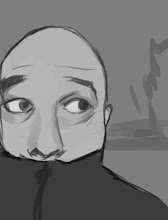I had the good fortune to go the San Diego Symphony last Friday night. They are a wonderfully talented group of musicians, and I am rarely disappointed when I get to go see them. I was particulary looking forward to this concert because they were playing Beethoven's Seventh Symphony, the second movement of which is one of my very favorite pieces of music. Seriously, if you have not heard this piece of music, I insist that you walk, nay, run to your local purveyor of classical music and purchase it. It should be noted that it is unacceptable to drive because music grads are elitist and want everyone else to have to work for beauty.
However, in the first half of the program, they world-premiered a new double concerto (which for you non-music majors is a lot like a symphony except that it is a platform for virtuosity through instrumental solos: a concerto would have one soloist, a double concerto two, etc.) that, although I laud them for their showcasing new music, kind of wore me out. Perhaps I'm a musical Philistine, but I have a difficult time with both new music and opera, albeit for different reasons. New music seems to rely too much on innovative techniques as opposed to relying on actual music.
At this point, let me state that by new music, I mean most all "classical" music composed within the last sixty to seventy years. Let me also state that I don't think it's bad or anything, I just don't understand it yet to the point that I can really enjoy it.
Having said that, I think the gf made a good point about when she said that there were a lot of good musical ideas, they just didn't form a cohesive whole. So, if the double concerto were a paragraph, it would look like this:
The Piedmont is esteemed above all for its red wines. I fell down at school the other day. WHAT A GAME! My hunger to succeed feeds at my very soul. Why on earth would you wear a bonnet when it's 1995?
All of those sentences work in the appropriate context, but together they make something that your average bowl of alphabet soup would dream of creating.
The most obviously innovative aspect of the performance was that at certain times in the second movement the composer titled something like "The rose dying", the percussionists took to ripping apart pieces of colored paper. This was effective aurally, but it was also effective visually, and it was here that I took offense. It seems to me that music needs to be essentially aural: Nietszche says that "In music, the passions enjoy themselves." He wrote about music in great lengths (dang loquacious syphilitic Germans), and his basic idea about it was that music was the most perfect art form because it was the most personal. That is, any music (without words) will create a unique response in the listener greater than any other medium due to the fact that you can only hear it; something you cannot see or touch but only hear will elicit a different response in every person who comes into contact with it. I say all this to say that by giving the listener something to watch other than the orchestra, the composer is taking a purely aural art form and making it visual. Perhaps blending sensory perceptions was his point, but to me, it was an innovation that didn't need to be made in the realm of symphonic music.
You readers may respond however that "This composer has written more music and been performed more often than you have, so it would perhaps do you good to take some notes from him and not to throw stones."
Duly noted.
7 hours ago


1 comment:
Hey doesn't an oratorio, numerous vocal pieces, and a beautiful love song to your gf count for anything anymore? That composer can duly note that he stinks. You can duly note that you are awesome. Also, this will probably only make sense to AC, is there not a way that I can make my comments only visible to you, AC?
Post a Comment